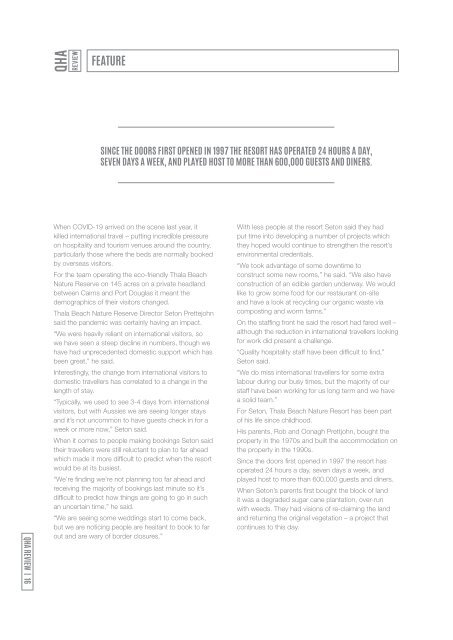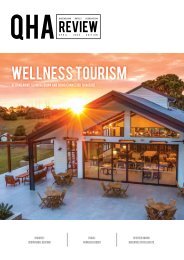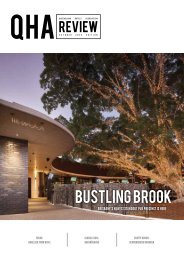QHA_August-2021-Digital
You also want an ePaper? Increase the reach of your titles
YUMPU automatically turns print PDFs into web optimized ePapers that Google loves.
FEATURE<br />
SINCE THE DOORS FIRST OPENED IN 1997 THE RESORT HAS OPERATED 24 HOURS A DAY,<br />
SEVEN DAYS A WEEK, AND PLAYED HOST TO MORE THAN 600,000 GUESTS AND DINERS.<br />
<strong>QHA</strong> REVIEW | 16<br />
When COVID-19 arrived on the scene last year, it<br />
killed international travel – putting incredible pressure<br />
on hospitality and tourism venues around the country,<br />
particularly those where the beds are normally booked<br />
by overseas visitors.<br />
For the team operating the eco-friendly Thala Beach<br />
Nature Reserve on 145 acres on a private headland<br />
between Cairns and Port Douglas it meant the<br />
demographics of their visitors changed.<br />
Thala Beach Nature Reserve Director Seton Prettejohn<br />
said the pandemic was certainly having an impact.<br />
“We were heavily reliant on international visitors, so<br />
we have seen a steep decline in numbers, though we<br />
have had unprecedented domestic support which has<br />
been great,” he said.<br />
Interestingly, the change from international visitors to<br />
domestic travellers has correlated to a change in the<br />
length of stay.<br />
“Typically, we used to see 3-4 days from international<br />
visitors, but with Aussies we are seeing longer stays<br />
and it’s not uncommon to have guests check in for a<br />
week or more now,” Seton said.<br />
When it comes to people making bookings Seton said<br />
their travellers were still reluctant to plan to far ahead<br />
which made it more difficult to predict when the resort<br />
would be at its busiest.<br />
“We’re finding we’re not planning too far ahead and<br />
receiving the majority of bookings last minute so it’s<br />
difficult to predict how things are going to go in such<br />
an uncertain time,” he said.<br />
“We are seeing some weddings start to come back,<br />
but we are noticing people are hesitant to book to far<br />
out and are wary of border closures.”<br />
With less people at the resort Seton said they had<br />
put time into developing a number of projects which<br />
they hoped would continue to strengthen the resort’s<br />
environmental credentials.<br />
“We took advantage of some downtime to<br />
construct some new rooms,” he said. “We also have<br />
construction of an edible garden underway. We would<br />
like to grow some food for our restaurant on-site<br />
and have a look at recycling our organic waste via<br />
composting and worm farms.”<br />
On the staffing front he said the resort had fared well –<br />
although the reduction in international travellers looking<br />
for work did present a challenge.<br />
“Quality hospitality staff have been difficult to find,”<br />
Seton said.<br />
“We do miss international travellers for some extra<br />
labour during our busy times, but the majority of our<br />
staff have been working for us long term and we have<br />
a solid team.”<br />
For Seton, Thala Beach Nature Resort has been part<br />
of his life since childhood.<br />
His parents, Rob and Oonagh Prettjohn, bought the<br />
property in the 1970s and built the accommodation on<br />
the property in the 1990s.<br />
Since the doors first opened in 1997 the resort has<br />
operated 24 hours a day, seven days a week, and<br />
played host to more than 600,000 guests and diners.<br />
When Seton’s parents first bought the block of land<br />
it was a degraded sugar cane plantation, over-run<br />
with weeds. They had visions of re-claiming the land<br />
and returning the original vegetation – a project that<br />
continues to this day.

















